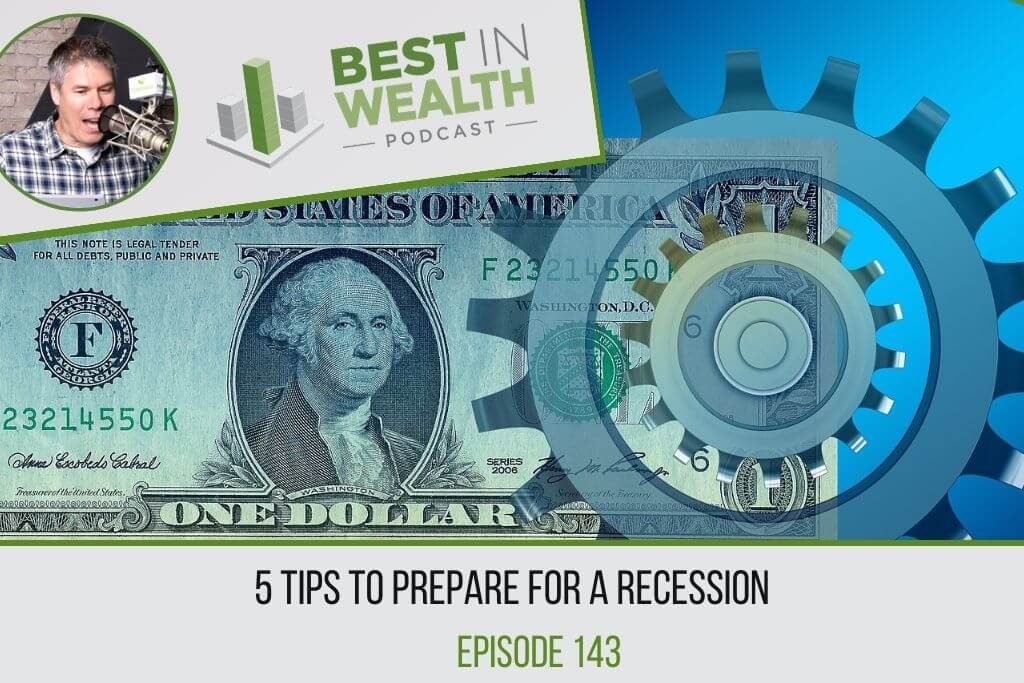5 Tips to Prepare for a Recession, Ep #143

Is it time to prepare for a recession? I predicted at the end of 2019 that one would be coming—and many argue that we are already deep in the trenches. But what is a recession? What indicates that we ARE in a recession? In this episode of Best in Wealth, I will share those indicators, what we can learn from past recessions, and 5 tips to prepare yourself and your family.
In this episode of Best in Wealth I share 5 Tips to prepare for a recession. Don’t miss it! #wealth #retirement #investing #PersonalFinance #FinancialPlanning #RetirementPlanning #WealthManagement Click To TweetOutline of This Episode
- [4:25] How I predicted a recession was coming
- [6:20] What is the definition of a recession?
- [7:03] What are the indicators of a recession?
- [10:07] What we can learn from past recessions?
- [16:30] Recessions do not need to be scary
- [17:40] 5 Tips to prepare for a recession
- [24:55] What did we accomplish while life was standing still?
What IS a recession?
The definition of a recession is a period of economic decline within a certain region such as the United States. There must also be at least two quarters of negative Gross Domestic Product (GDP). Technically speaking, we will not know if we are in a recession until the GDP reports for the 1st and 2nd quarters of 2020 are released. So what are the indicators of a recession?
- An increase in unemployment numbers
- A downturn in the stock market
- A downturn in the housing market
- Negative returns in GDP
We are slowly checking the boxes on all these indicators. Unemployment is past 20%. The stock market at its lowest was down -37.5% from its 52-week high. It’s projected that home sales will drop 35% in the 2nd quarter compared to the end of 2019. The GDP will be the final nail in the coffin, but it appears we are well on the way to our 16th recession.
What we can learn from past recessions?
The question at the back of everyone’s minds is “Should I be afraid?”. The best way to answer that question is to look at statistics from past recessions.
- There have been 16 recessions since 1929
- The average recession lasts 16 months
- 11 of 15 recessions end with your portfolio in positive territory after 2 years
- 4 of the 15 recessions required holding your portfolio 3-5 years to see positive returns
- Only one recession—the great depression—required holding your portfolio for over 10 years to see a positive return
Recessions do not need to be scary. The mass media wants us to believe they are so we make emotional decisions. Stocks WILL go down, but they WILL recover. So hold tight and do not make emotional decisions.
What can we learn from past recessions? Listen to this episode of Best in Wealth to find out! #wealth #retirement #investing #PersonalFinance #FinancialPlanning #RetirementPlanning #WealthManagement Click To Tweet5 tips to prepare for a recession
I wanted to share 5 tips to help you prepare for a recession. You do not have to panic and make hasty decisions. Instead, this is what I recommend:
- Keep investing. The money you invest this year will have more growth potential than what you invested in 2019 because you are buying in at lower values. Have any extra money on the sidelines? Put it to work!
- Do not take your inflation adjustment. If you are retired, you typically take out 4% from your retirement nest egg, plus a percentage for the rate of inflation. I recommend leaving the extra percentage in your portfolio this year to extend its longevity.
- Build a spending plan. Put a budget in place and track your expenses so you use your money wisely. You will often be able to find extra money that was being wasted.
- Increase your emergency fund. I recommend having 3-6 months worth of expenses in an emergency fund. The larger it is, the longer you can withstand not getting a paycheck. I recommend splitting any extra money (stimulus checks anyone?) you have between your emergency fund and investments.
- Cut back on your spending. Anyone else have Amazon packages on their doorstep every day? It is easy to spend more than necessary when you have more time on your hands. But it is important to curb your spending and save it for necessities.
These 5 simple tips help you prepare for a recession—and get through to the other side.
Hopefully the season we find ourselves in never happens again. But I want you to ask yourself: What am I doing to take advantage of this time? Are you spending this season of your life complaining? Or finding ways to accomplish something positive? I want to leave you with that challenge. These are trying times—but you can come out on the other side stronger and proud of how you navigated this season.
Want to learn 5 ways you can prepare for a recession? Listen to this episode of Best in Wealth to find out! #wealth #retirement #investing #PersonalFinance #FinancialPlanning #RetirementPlanning #WealthManagement Click To TweetResources & People Mentioned
- Home Sales Projections
- Best in Wealth Episode 137
- Best in Wealth Episode 140
Connect With Scott Wellens
- Schedule a discovery call with Scott
- Send a message to Scott
- Visit Fortress Planning Group
- Connect with Scott on LinkedIn
- Follow Scott on Twitter
- Fortress Planning Group on Facebook
Podcast Disclaimer:
The Best In Wealth Podcast is hosted by Scott Wellens. Scott Wellens is the principal at Fortress Planning Group. Fortress Planning Group is a registered investment advisory firm regulated by the Securities Act of Wisconsin in accordance and compliance with securities laws and regulations. Fortress Planning Group does not render or offer to render personalized investment or tax advice through the Best In Wealth Podcast. The information provided is for informational purposes only and does not constitute financial, tax, investment or legal advice.



